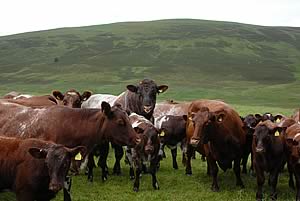 |
|||||||||
|
|||||||||||||||||||
|
|
NFUS
Requests Changes To Cattle Passport Rules 11/01/07 NFUS is urging the Executive to alter the rules for dealing with late cattle passport applications.
The points have been made in the Union’s response to the Executive’s current consultation on changes to cattle identification and passport applications. Farmers are required to register the birth of cattle with the British Cattle Movement Service (BCMS), the UK’s central cattle database, within 27 days of the birth. The penalty for late applications is severe – no passport is issued, which effectively renders the animal worthless as it cannot go into the food chain and cannot move off the farm except direct for slaughter and rendering. As of last year, following discussions between NFUS and the Scottish Executive, it was agreed that some discretion may be exercised where applications arrive with BCMS shortly after the 27-day deadline, but only if there are clear reasons for the delay that are outwith the farmer’s control. It is hoped that this will address the problem of postal delays. However, this does not address the remaining late applications, nor the cattle currently on farms without a passport, hence the NFUS call for a change to the rules. NFUS President John Kinnaird said: “It is in everyone’s interest to ensure the cattle database is as comprehensive as possible. The problem of late passport applications has been a long-running sore point for the industry. “We had very constructive discussions with Executive officials last year. We have welcomed the discretion now afforded to BCMS to consider applications that are delayed for reasons outwith the farmer’s control. This should address the majority of problems. At that time, the Executive promised to consult on DNA testing and other measures to address other cattle without passports; a consultation we have now responded to. “For farmers that don’t secure a passport in the required time or who currently have animals without passports, there should be a system which involves them either paying for a DNA test or incurring small fine. That would maintain the incentive to apply on time, but avoid the huge financial hit on farms that comes with a passport refusal. Crucially, it would ensure that all cattle are within the passport control system.” Notes:
|
||||||||||||||||||

|
|
||||||||||||||||||
| home | agri-services | pedigree
pen | news | dairy | beef | machinery property | organisations | site map |
|||||||||||||||||||

